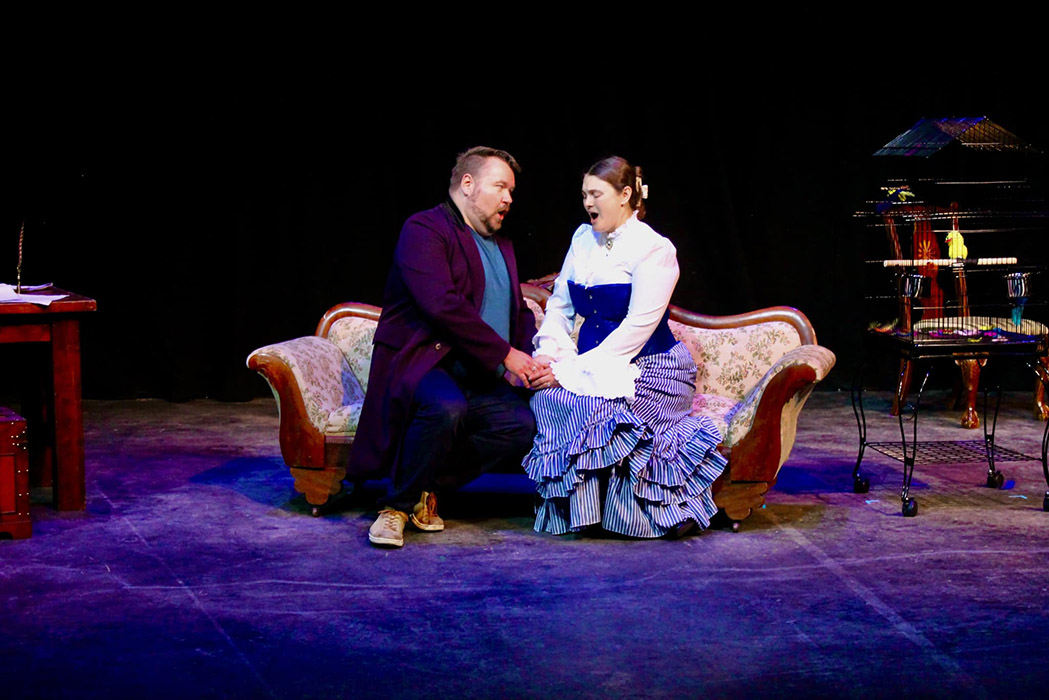In its ten years of existence, Marble City Opera has filled a niche in Knoxville’s music scene, a niche for which it seems it was destined. It has also earned a reputation for a mind-boggling variety of contemporary works with excellent singers, some productions being staged in wildly improvisational settings, without ever being accused of biting off more opera than it can chew. To be sure, chamber opera is not for the overly cautious—whether producers, performers, or audience. In fact, a sense of musical and theatrical adventure is definitely a prerequisite.
MCO’s latest adventure is The Infinite Energy of Ada Lovelace, which opened last evening at the intimate Old City Performing Arts Center. It has two more performances tonight (Friday) and tomorrow (Saturday). With an addictive music score by Kamala Sankaram and libretto by Rob Handel, the one-act chamber opera leaps into the domestic story of Ada Lovelace, the daughter of poet and adventurer, Lord Byron, and her work with mathematician and inventor of early computation machines, Charles Babbage, all the while torn between her husband and children and assisting Babbage with his developments in London.
Sankaram’s deliciously tonal score is loaded with poise and charm that feigns minimalism to suggest binary math, but wanders through some intriguing stylistic territory that has flavors and textures of jazz, blues, classical, and 19th century romanticism, among others. Scored for piano and string quartet, the work was strategically paced by conductor Christy Lee, who kept the instrumental ensemble, situated just off stage left, nicely balanced with the singers. Lee’s instrumentalists were Brandon Coffer, piano; Jeff Brannen and Heidi Mollers, violins; Amy Byrd, viola; and Kathryn York, cello.
The excellent cast of six seemed quite comfortable with Sankaram’s score and Handel’s libretto, each maintaining the clean diction which is essential in following the ins and outs of the storyline. Stage director Sierra Hammond kept the movement simple on the minimal set of furniture and props, letting body energy and voices do the storytelling.
Singing the role of Ada was Theresa Kesser who brought delightful vocal and dramatic duplicity to her character, a woman that is torn between lyrical domesticity and her innate need to be a part of something important in life.
Tenor Ben Werley sang the role of Ada’s husband, William King-Noel. Werley was impressive, both in softer lyrical moments, but especially in his poignant reflections on society’s expectations of what a wife should be. Baritone Daniel Spiotta as inventor Charles Babbage brought a warmth and necessary vocal maturity to his character, while also allowing just a hint of the conflicts and idiosyncrasies of a scientist to find their way to the surface.
In a way baffling, the character of Harriet Beecher Stowe, the American author and noted abolitionist, actually is important to the theme of “society scandals” bouncing through the opera. Sung by soprano Kathryn Grumley, the character of Stowe had traveled to London to interview Ada for her book on Lord Byron and her defense of Lady Byron. Grumley’s portrayal is deliciously peppery, fidgety, and energetic, giving her scene some roller coaster dramatics.
Filling out the cast of six were Kayla Beard (“the Nanny”) and Joel Brown (“the Butler”), both vocally and visually delightful in comic relief characters, giving evidence to the saying that there are no small roles.
This is the second production that MCO has staged in the Old City Performing Arts Center, following October’s Heartbreak Express—a physical arrangement that seems to work really well for the varying needs of chamber opera. Their next production, though, goes outdoors: Carlisle Floyd’s Susannah at Marble Springs Historical Site, June 8, 9, and 10.





